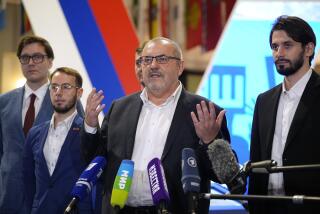Dudayev’s Death May Be Pivotal for Yeltsin
- Share via
MOSCOW — Gen. Dzhokar M. Dudayev’s violent death in Chechnya has ended one of the bitter personal feuds that shaped Russia’s early post-Soviet history. What does the victor, Boris N. Yeltsin, stand to gain?
As with so many other questions in Russia nowadays, the answer will come, in large part, from voters. Dudayev, who bedeviled Yeltsin with a declaration of his tiny Muslim republic’s independence and 16 months of guerrilla war, died convinced that the Russian president had ordered his assassination last winter to help himself get reelected in June.
That conviction, voiced by the Chechen leader in an interview with The Times five weeks before Sunday’s fatal Russian air strike, may never be proven, despite Yeltsin’s outburst in February that Dudayev and other top guerrilla leaders were “gangsters” who “should be shot.”
But Dudayev’s dramatic end, which came as he was reportedly calling a peace mediator on his satellite phone, means more than a momentary triumph of violent methods. It is a pivotal event with still-uncertain impact on Yeltsin’s political survival and his effort to keep the ethnically diverse Russian Federation intact.
Yeltsin’s underdog reelection campaign has stirred to life this spring. Polls published early this week showed him running even for the first time with Communist leader Gennady A. Zyuganov, the front-runner until now, each with about 20% support.
The war in Chechnya has been the incumbent’s Achilles’ heel, not just because of Russian army brutality against Chechen civilians, who account for most of the 20,000 dead, but because of something intensely personal. The president was mocked by a wanted fugitive who moved by night from one hide-out to another, denouncing Yeltsin to the world over his portable phone as a dictator as evil as Stalin.
Dudayev’s death, politicians and polling experts say, instantly raised the stature of the president simply by leaving him alone, like a boxer standing in the ring over a motionless opponent. Whether the war goes on, they argue, matters less, especially to Russia’s military officers and their families--a sizable chunk of voters.
“You need to know only the basics of Russian psychology to see how tremendously Yeltsin has scored,” Nikolai I. Travkin, a leader of the Our Home Is Russia alliance that backs the president, said at its congress here Thursday.
“People were so tired of all this endless talk about negotiations and seeing Russian soldiers killed,” he said, “that now they rejoice at a really tough response. They see Yeltsin punching Dudayev so hard that the guy just buys it. This boosts Yeltsin tremendously.”
Communists agree. “The timing of Dudayev’s death is more important than the death itself,” said Alexander Prokhanov, editor of the pro-Communist newspaper Zavtra. “He was killed when it was more profitable for Yeltsin than any time before, which shows how manageable this conflict is and always has been.”
But others caution that Yeltsin’s fate at the polls will depend more on whether fighting in Chechnya drops off before election day.
So far the new rebel leadership, an unpredictable group that may not stay unified, shows no willingness to stop fighting or start talking. In announcing Dudayev’s death, Shamil Basayev, the notorious Chechen commander who attacked a civilian hospital in Russia last summer, vowed to keep up the war “for 100 years.”
While Yeltsin may win reelection despite the war, the conflict has dragged on far too long and turned so many Chechens against him that his ability to end it, even in a second term, is far from certain.
Also, there is a new risk: Secessionists in neighboring Russian republics of the Caucasus Mountains hated Dudayev too; with him gone, they may join forces with the Chechen rebels and widen the war, threatening Yeltsin’s greater cause of keeping Russia together.
At best, Yeltsin could go down in history as the latest in a line of Kremlin rulers who, for more than three centuries, have subdued the unruly Chechens--only to bequeath blood hatreds and seeds of new conflict to another generation.
More to Read
Sign up for Essential California
The most important California stories and recommendations in your inbox every morning.
You may occasionally receive promotional content from the Los Angeles Times.













